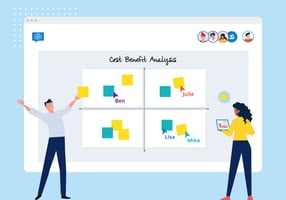Currently, there’s significant interest in investing in artificial intelligence (AI) across numerous EPC companies. In fact, as shared in an analysis by Global Banking and Finance Review, AI investments in the construction market are anticipated to reach $4.51 billion by 2026. As our post ‘5 Ways EPC Companies Can Use AI to Edge Out Competition’ states, the drive to leverage these technologies is due to advantages such as they can help boost the reliability of planning and scheduling, decrease human error, and promote comprehensive monitoring of projects in real time.
All that said, it’s clear that AI-backed applications are beneficial for EPC companies. Of course, because these initiatives can be quite costly and are relatively new, it’s crucial that said businesses are adequately prepared to integrate this technology into their processes. Below, this article will expound on how EPC companies can bridge the gaps between adopting AI.
Perform a cost-saving analysis
 For EPC companies, the first step in ensuring a smooth AI adoption process is performing a cost-saving analysis. After all, the initial expenses of investing in these technologies (like robotics) are usually steep. For starters, a 2022 report published on ResearchGate titled ‘Artificial Intelligence Feasibility in Construction’ recommends that organizations should first identify which areas AI-powered tools will have the most effect in the short term. This could either be in waste management, supply chain management, or project estimation and scheduling.
For EPC companies, the first step in ensuring a smooth AI adoption process is performing a cost-saving analysis. After all, the initial expenses of investing in these technologies (like robotics) are usually steep. For starters, a 2022 report published on ResearchGate titled ‘Artificial Intelligence Feasibility in Construction’ recommends that organizations should first identify which areas AI-powered tools will have the most effect in the short term. This could either be in waste management, supply chain management, or project estimation and scheduling.
Businesses should likewise calculate their ROI (return on investment) and how much it will cost to invest in analytics platforms, for instance. Lastly, take note of how much maintenance these applications will require, as this helps ensure that you can utilize the likes of robotics equipment for a long time. For smaller EPC companies, assessing the cost savings and ROI of AI-driven tools means that you can make wiser investment choices, and subsequently, foster a smoother adoption of such applications.
Leverage project management software
 Deploying AI technologies can be challenging for EPC companies. This is because, according to a study by the Journal of Open Innovation on the adoption challenges of AI, the work process of doing so is complex. It requires many steps in the planning stages, such as checking if a company has enough resources or machine-learning-educated workers that can achieve the goals of the initiative.
Deploying AI technologies can be challenging for EPC companies. This is because, according to a study by the Journal of Open Innovation on the adoption challenges of AI, the work process of doing so is complex. It requires many steps in the planning stages, such as checking if a company has enough resources or machine-learning-educated workers that can achieve the goals of the initiative.
As such, it’s important for project managers to leverage project management software that can streamline these tasks. An LHH article explains that project managers, traditionally, are responsible for adjusting schedules and targets based on what the project needs. Because of their knowledge of project management processes and workflows, they can develop effective strategies on how to mitigate issues when they arise. Now, with the help of project management software, these professionals can also better handle budget management and accounting tasks. After all, the study states that AI technologies can require high costs to obtain additional data—which is why it’s imperative that project managers can make informed decisions on how to accommodate financing changes when adopting AI.
Utilize blockchain to enhance trust and transparency
 Construction sites are constantly evolving. As the referenced Journal of Open Innovation study shared, new technologies—like IoT sensors—are becoming more prevalent on sites to produce valuation data. While these digital tools can help optimize site performance, it isn’t unheard of for construction companies to prioritize traditional methods. This is because mistakes caused by using untrusted technologies can result in negative financial implications.
Construction sites are constantly evolving. As the referenced Journal of Open Innovation study shared, new technologies—like IoT sensors—are becoming more prevalent on sites to produce valuation data. While these digital tools can help optimize site performance, it isn’t unheard of for construction companies to prioritize traditional methods. This is because mistakes caused by using untrusted technologies can result in negative financial implications.
Luckily, EPC companies can utilize the blockchain to enhance trust and transparency among stakeholders and site workers alike. In the above study, blockchain is described as a worthwhile solution that can help individual organizations transition to future models which make use of AI.
When an AI system is created within blockchain networks, it can generate confidential data sharing and AI models’ ownership traceability. In addition, an Expert Systems with Applications article on blockchain technology illustrates that, by utilizing smart contracts, the construction industry can seamlessly modify outdated AI models. Given that, EPC companies can assure relevant stakeholders that future AI-driven applications can evolve according to the needs of the business.
AI technologies are beneficial in EPC companies as they can help optimize work processes. That said, hopefully, the above tips can help ensure a more effective and efficient AI adoption process.
Interested to know, how to leverage Explainable artificial Intelligence (XAI), to drive efficiency and innovation in Engineering, Procurement, and Construction? Download our free e-book, “Predictive Analytics and AI: A Match Made in EPC Heaven” today.

